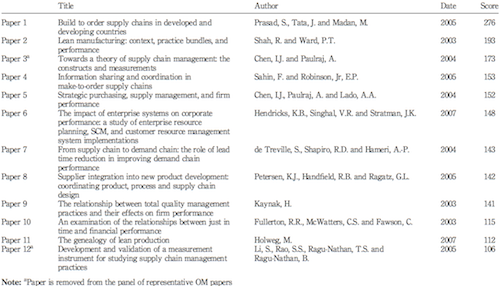How relevant are Business Sciences to managerial Practice?
There are only very few studies, which investigate the impact of research in business has on the actual research field.
In other fields the impact is easily seen. Without research there would be no modern medicine, without research there would be no buildings rising 800m and more.
But where would business be without research in the business and economics sciences?
For the part of operations management (OM) research the authors de-Margerie and Jiang (2011; “How relevant is OM research to managerial practice?”) analyze the key factors of literature to be relevant for practitioners.
Method
Impact on business oriented problems is a major criterion for many leading OM journals. To analyze the factors the authors employed an expert panel, made up from senior practitioners with cross-functional experience in international operations. Each of them was assigned with the task of reading and assess the ten most downloaded papers of the Journal of Operations Management.
The selected papers are listed in figure 1.
The assessment was based on seven criteria and graded on a five point Likert scale.
- Descriptive relevance (e.g. “this article’s findings represent the ‘real world’”)
- Goal relevance (e.g. “the article produces definitive results for decision making”)
- Non-obviousness (e.g. “this article’s findings are just common sense”)
- Timeliness
- Readability (e.g. “this article is too abstract or complicated to be understood”)
- Topic (e.g. “this article has a guideline that connects the reader to the problem and solutions”)
- Usefulness
Results
Based on the direct survey data from practice [in this study], this research empirically derived a much smaller number of dimensions as replacements for the original variables of relevance while still retaining their original character.
The first finding is represented by the three criteria which are used by the practitioners to evaluate OM research.
- “whether academic research is applicable or implementable to the practice;”
- “whether academic research provides novel insights or new perspectives to management; and”
- “whether academic research helps practitioners recognize their situation (i.e. communicates in recognizable ways).”
Furthermore the authors show that the evaluated ten papers did achieve high score in the second and third criterion.
Since these papers were primarily downloaded by other OM researchers, these papers should be important or relevant to other OM scholars’ research. Therefore, we may conclude that the academia of OM shares the second and third criteria of relevance with the practice.
The authors explain the lower scoring of the first criterion with the “the conflict between academic research’s goal and executive’s expectations. Practitioners expect to obtain immediate resolutions of current problems in specific operational contexts. In contrast, scholarly researchers ‘are required to reflect on the implications of innovations in an effort to distill knowledge that will stand the test of time and be applicable over a wide array of situations’”
Conclusion
This again was a very nice article.
- Methodically, all steps are explained in detail and the assumptions seem reasonable.
- Formally, the article guides the reader through its content without loosing the red thread from the research question to the presentation of the results.
- Content-wise, the article touches interesting new grounds. Of course research should never follow practice blindly, so a gap between research and practice is only natural. For me, another interesting question on a broader scale would be, to what degree business research is transferred to practice.
de-Margerie, V., & Jiang, Bin (2011). How relevant is OM research to managerial practice? International Journal of Operations & Production Management, 31 (2), 124-147








Add new comment